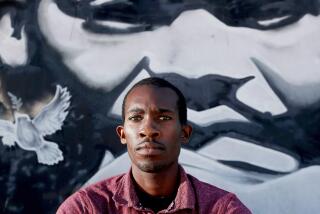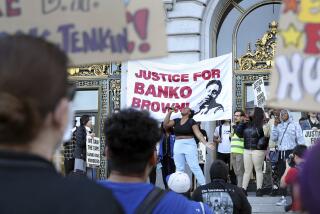Arrest Revives Imam’s Fiery Political Past : Crime: Now a Muslim, the former H. Rap Brown says accusation of shooting a man continues harassment he faced as a Black Panther in the ‘60s.
- Share via
ATLANTA — For almost 20 years, the man formerly known as H. Rap Brown has lived a quiet life in southeast Atlanta where he has operated a small grocery store and presided over a fast-growing Muslim community.
But, with his arrest last week in connection with a shooting, his past as a fiery leader in the Black Panther Party who once called violence “as American as cherry pie,” came flying back.
Suddenly, Brown--now known as Jamil Abdullah Al-Amin--was back in front of television cameras, accusing the government of conspiracy, of hounding him and his followers because of their beliefs.
Al-Amin was arrested Aug. 7 by Atlanta police accompanied by agents of the FBI and the Bureau of Alcohol, Tobacco and Firearms. Police said a 23-year-old Atlanta man, William Miles, had accused the Islamic leader of shooting him in the leg with a handgun as he walked past the grocery store July 26. No motive has been disclosed for the shooting, and Al-Amin was released on bond.
Al-Amin, who is known by the religious title imam, said Tuesday the shooting charge is a continuation of the “harassment” he faced in the 1960s. He said he is being targeted both because of his past militancy and because of his increasing political activism as part of the growing American Islamic movement.
“The growth of Islam is something that suggests to [federal authorities] that this is something that must be oppressed,” said Al-Amin, dressed in sandals and long white and rust-colored robes. On his head he wore a knitted cap with a white scarf wrapped like a turban. Blue jeans peeked out beneath the robes.
Al-Amin’s attorney, Bruce Harvey, contended that Miles was pressured to identify his client as his assailant and noted that in his original police statement he described his assailant as having black dreadlocks. Al-Amin has close-cropped graying hair. He also has a beard while the police report makes no mention of facial hair.
“I am convinced this particular allegation is the result of a pattern of persecution and harassment against the Muslim community here in Atlanta,” Harvey said.
Authorities deny the allegation.
Two members of Al-Amin’s mosque, licensed firearms dealers, were arrested two years ago and convicted in connection with an illegal gun-running operation that authorities say moved 900 handguns to New York and Philadelphia. Many of the guns were later used in street crimes by drug dealers and people arrested for armed robberies, said Special ATF Agent Bobby Browning.
“His [Al-Amin’s] name did surface several times during the firearms-trafficking investigation,” Browning said, but authorities did not develop evidence linking him to the crime. He said the two Atlanta men arrested operated a gun shop next next door to Al-Amin’s store. He stressed, though, that while Muslims in Atlanta and New York were involved, authorities never viewed the operation as being connected to the religious body.
Al-Amin accused the ATF and FBI of having waged a continuous campaign against him for the past seven years and of trying relentlessly to connect him to gun running. But Browning said the federal investigation of Al-Amin began only after his name surfaced during the course of their inquiry. One ATF and one FBI agent participated in the arrest because local police suspected Al-Amin of violating federal firearms charges, he said. Police said Al-Amin was carrying a semiautomatic pistol and a knife when he was arrested.
As a convicted felon, it is a federal offense for Al-Amin to have a gun. Al-Amin was convicted of robbery in 1971 and served five years in prison after a shootout with New York police officers that left him and two officers wounded.
He converted to Islam while in prison. Since moving to Atlanta in 1977, he has become a national leader in the Islamic movement, serving as imam of 30 communities across the country. He has traded in his once-incendiary rhetoric for quiet religious teaching and has taken a strong stand against alcohol and drugs.
Noting the increasing suspicion of Muslims in connection with terrorist activities, he said the growth of the Islamic movement and the trend toward political activism is what authorities find threatening.
More to Read
Sign up for Essential California
The most important California stories and recommendations in your inbox every morning.
You may occasionally receive promotional content from the Los Angeles Times.










